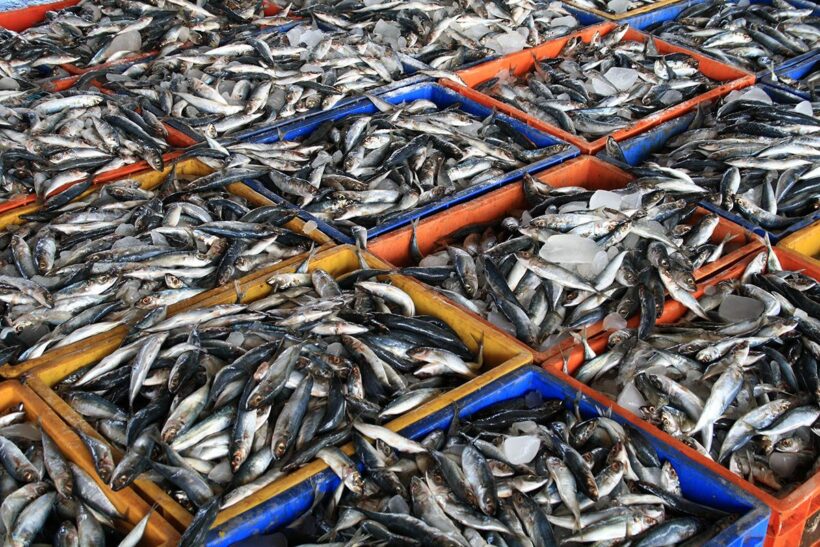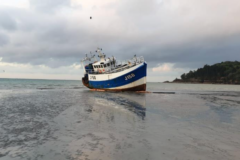NESFDP meeting told of wide-ranging concerns across Scottish industry
ICES advice for 2025 catching opportunities is ‘mainly positives rather than negatives’, SWFPA chief executive Mike Park told the North East of Scotland Fisheries Development Partnership (NESFDP) at its meeting on 6 September, but the catching sector has ‘a load of challenges just now’.
The positives include an increase in Rockall haddock of around 700% and a potential 170% increase in monkfish; a downside is the proposed 38% reduction in northern shelf cod.
Other challenges, he said, were wide-ranging. “There is a consultation out on offshore MPAs which has the potential of shutting down even more areas of the sea, we’re still battling with offshore renewables and the loss of fertile areas there, and the UK catching policy is looking to replace the transposed EU law currently in place.
“We have the issues with the Fisheries Improvement Plans, transition to MSC certification for species such as scallops and Nephrops, and we’re coming under scrutiny over modern-day slavery issues.”
Mike Park said he had been asked to put the economic viability of the fleet on the agenda for the last SWFPA meeting, which was ‘the first time for a long, long time – which says a lot about how the industry is being squeezed in terms of what it’s getting for its product and the increase in costs’.
Macduff Shellfish director Andrew Brown, a vice-chair of the NESFDP and chair of the Scottish Seafood Association (SSA), said that was ‘not the end of it’. A consultation on inshore MPAs soon would exacerbate spatial pressure.
“It’s difficult to make a judgement now without seeing the proposals for the inshore sector, but I guess we can expect the same black and white question – whether the whole site is protected or whether it’s zoned. It will be an additional pressure, and the displacement effects are difficult to take into account,” he said.
Cllr Mark Findlater said he had been talking to a lot of inshore fishermen and there was ‘real concern’ about the forthcoming inshore MPA proposals. He said the problem would be in the detail, and that the phrase ‘fishing on a postage stamp’ was being used because of the ground being lost to renewable energy projects in the region.
Giving a roundup of the situation in the Scottish processing sector, Andrew Brown said recruitment remains the ‘number one challenge’ for the sector. He told the meeting it was ‘very important’ to forge relationships with the new UK administration on this issue to ensure it understood the issues and the ‘urgency of the solution that is required’.
NESFDP chair Cllr Ann Bell said the partnership was putting together a working group to look at the training of ‘home-grown’ labour, working with Seafish and Seafood Scotland on a strategy for the long term. A meeting is due to be held in late September or early October.
Another issue of concern to the processing sector, said Andrew Brown, was the Seafish levy. Seafish recently completed a formal consultation with the industry that proposed increases in the levy. This is paid on the first-sale value of all landed and imported fish, so processors are facing increased costs.
Andrew Brown said this was an issue because although Seafish did a lot of good work, much of it was not visible to processors, and they questioned the value for money they were getting.
“The levy system is a bit outdated. It was first designed in the early 1980s and hasn’t changed since, and the world has moved on,” he said.
“A lot of processors feel they are paying an excessive amount for limited value. For example, the aquaculture industry does not contribute to the levy, although much of Seafish’s work does contribute to the knowledge of and development of aquaculture products.”
He said the SSA has made representations to UK and Scottish ministers on the levy, trying to look beyond the current proposals and fully update it – but a difficulty was that a fundamental change to the Seafish levy would require going back to the primary legislation, and that would take some time.
Another issue that has come to the fore recently related to standards in the processing sector. “Quayside prices are high, market demand remains slow, so margins are squeezed,” said Andrew Brown.
“There is a feeling that the value of the product is being undercut by a number of processing operators who are in low-standard facilities and are selling cheap, undermining the price and also the reputation of Scottish products. This issue raises itself every time margins are squeezed.”
This story was taken from the latest issue of Fishing News. For more up-to-date and in-depth reports on the UK and Irish commercial fishing sector, subscribe to Fishing News here or buy the latest single issue for just £3.50 here.
Sign up to Fishing News’ FREE e-newsletter here.






